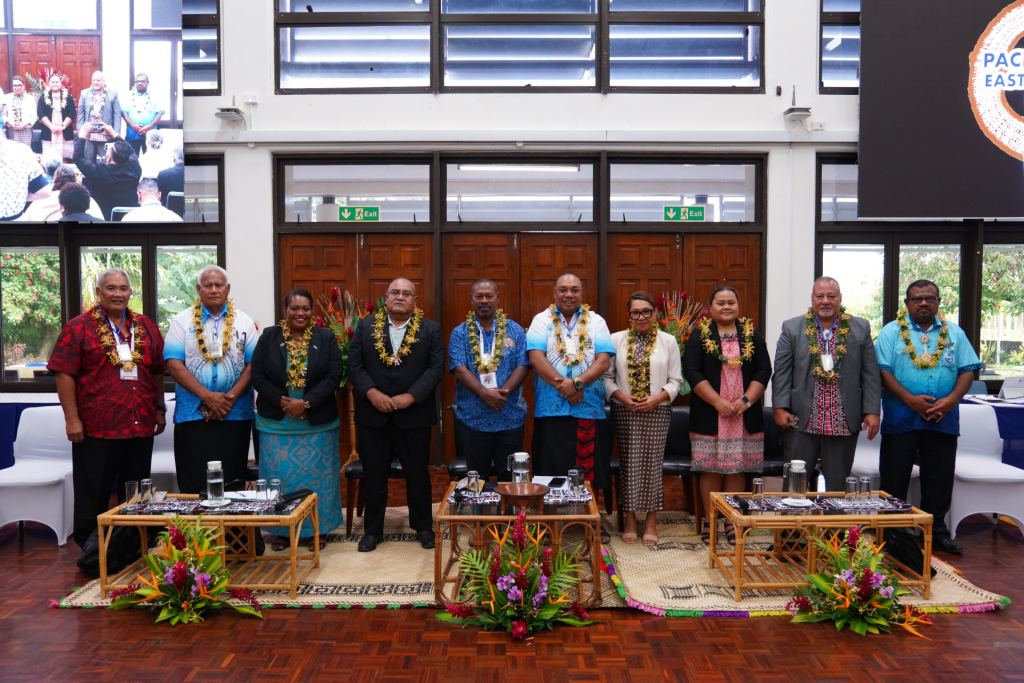The Minister for Fisheries and Marine Resources, Honourable Jelta Wong, on Monday 24th February 2025, addressed the gathering of Pacific Island Leaders at the East New Britain Initiative (ENBi) during the weeklong Honiara Summit.
Minister Wong emphasized the vision behind ENBi as a collaborative platform aimed at enhancing coordination and cooperation among Pacific Island countries to advance our shared aspirations for sustainable tuna fisheries development.
“When discussing the retention of value from our region’s tuna catches, we are reminded of the many challenges facing Pacific Island nations,” Minister Wong said.
“These challenges include inadequate infrastructure, unreliable utilities, high operational costs, limited skilled labour, and geographical remoteness from major markets.”
“These challenges will persist if we continue to operate independently, with each Pacific country pursuing tuna fishing and processing investments in isolation.”
“ENBi seeks to shift this paradigm by promoting regional collaboration and leveraging our collective strengths.”
ENBi is founded on the belief that Pacific Island nations can achieve more by working together, leveraging each country’s unique strengths to overcome shared challenges.
This approach creates opportunities to develop robust business cases that can be pursued with distant water fishing nations, leading fish trading companies, or forward-thinking investors.
Minister Wong emphasized that stakeholders recognize the immense value Pacific nations bring as custodians of some of the world’s best managed tuna resources.
ENBi serves as a platform for Pacific Island countries to identify strategic entry points, form alliances, and actively participate in commercial tuna ventures and supporting industries.
“The essence of our Pacific way of life is at stake if we allow ourselves to be controlled by external forces dictating global prices,” Minister Wong added.
“We are the rightful stewards of our resources.”
“It is imperative that we unite as a cohesive region, rather than allowing ourselves to be picked off one by one.”
“We must cultivate a narrative that reflects our collective identity, with ENBi as our vital connection.”
“The so-called civilized nations that seek to guide our lives often overlook our rich traditions and cultures, offering misleading aid to maintain their relevance while their foreign policies aim to suppress us.”
“Fellow Pacific Islanders, this is our moment to stand together.”
“Just as the tuna roam freely in our waters, we must recognize our power and potential.”
He further quoted Lao Tzu, who teaches us: “Give a man a fish, and you feed him for a day; teach him to fish, and you feed him for a lifetime.”
In our context, if we retain our fish within our region and process it ourselves, we will secure revenue for generations to come.
“Now, more than ever, we can take decisive action amidst global tensions.”
“We must develop strategies that empower us and safeguard our future.”
“Let us no longer be passive observers.”
“It is time for us to enact meaningful change.”
“No one understands the Pacific better than we do, and the responsibility to shape our destiny lies solely in our hands.”
“Together, we will forge a brighter future for ourselves and generations to come.”
Minister Wong stressed that, despite the vital role Pacific nations play in sustainably managing tuna fisheries, these efforts remain largely unrecognized in global markets.
“Our investments in vessel monitoring systems, Observer Programs, and monitoring are integral to responsible fisheries management.”
“But who benefits from these investments and management plans? Is it us?”
Minister Wong is hopeful that one day the ENBi logo will be on canned tuna products, signaling to customers that the benefits derived from the catch, processing, and sale of these products are shared by multiple Pacific Island countries.
To realize this, it is imperative that all Pacific nations work with eco-label organizations and internationally recognized NGOs to amplify our message.
Minister Wong pointed to the Republic of the Marshall Islands’ Pacific Island Tuna project with Walmart as a prime example of what can be achieved.
This project disrupts existing supply chains by aggregating MSC-certified tuna through dockside offloading and freighting to tuna processors for Walmart.
He expressed his satisfaction that the Republic of the Marshall Islands intends to scale this opportunity through partnerships with the Federated States of Micronesia, Papua New Guinea, and potentially other Pacific countries.
This is what ENBi is all about.
“Papua New Guinea aims to position itself as a regional tuna processing hub, like several other Pacific countries.”
“PNG operates six processing plants, with a combined designed daily processing capacity of over 1,000 metric tonnes.”

